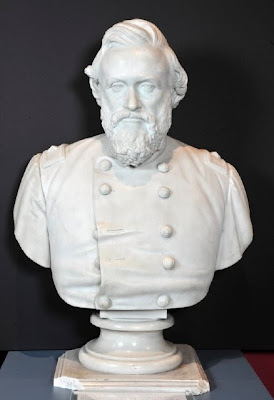 In the fall of 1863, General Jeremiah T. Boyle (bust image to right) requested permission from Secretary of War Edwin M. Stanton to enlist "two to three thousand negroes as teamsters" to transport supplies from Kentucky to Knoxville for the campaigns going on in East Tennessee.
In the fall of 1863, General Jeremiah T. Boyle (bust image to right) requested permission from Secretary of War Edwin M. Stanton to enlist "two to three thousand negroes as teamsters" to transport supplies from Kentucky to Knoxville for the campaigns going on in East Tennessee.Stanton approved the request but made a few stipulations. First, "loyal owners" had to be paid $300 and sign a deed of manumission; second, the enlisted teamsters had to be paid $10 per month, and finally, "slaves so enlisted" were "to be forever free at the expiration of their term of enlistment."
About a month after receiving Stanton's approval and demands, Boyle wrote back explaining, "I am not so sanguine of the success [of finding teamsters] as I was then. One problem was finding the required "loyal owners." Another was how and when the slaves were to be paid for. Boyle said though that some owners seemed ready to at least receive some compensation rather than see their slaves run off and not get anything.
Before Boyle had responded to Stanton, he had asked Kentucky Governor Thomas E. Bramlette's opinion on the matter. Bramlette responded that the request had been received and considered. He further explained that it was the owners' decision, not the governor's, to hire their slaves or "dispose of them to the Government upon the terms and for the purposes set forth in your letter." However, owners doing such should understand that the Constitution of Kentucky and the laws of the state made it clear "with view to his freedom at the expiration of the service [that the slave was] forbid that he shall remain in Ky after his discharge."
Bramlette believed that "many [slaves] will refuse to accept freedom upon the only terms admisable [sic] under our laws. Where no other provision is made for the removal and settlement of emancipated slaves, our laws require that the slave shall be hired out until a sufficient fund for his removal and settlement is raised, and then be removed and settled beyond the limits of the state, Whatever may be the views of others as to the policy or humanity of this law, as Chief Executive of the State I shall enforce it without the slightest scruple or relaxation."
Apparently, due to a combination of difficulty in finding willing owners to sell their slaves to the government for $300, and a lack of willingness on the part of slaves to agree to the the state laws of removal, not much interest was expressed by either and the plan to enlist teamsters ended in failure.
Bust image of Gen. Boyle courtesy of the Kentucky Historical Society.







No comments:
Post a Comment